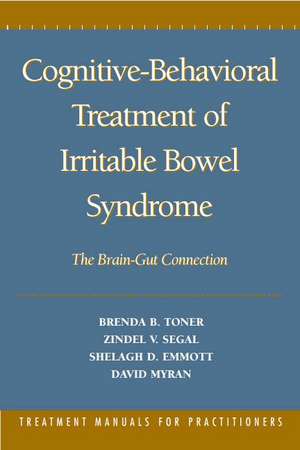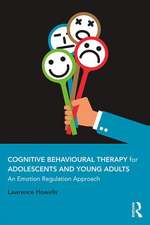Cognitive-Behavioral Treatment of Irritable Bowel Syndrome: The Brain-Gut Connection: Treatment Manuals for Practitioners
Autor Brenda B. Toner, Zindel V. Segal, Shelagh D. Emmott, David Myranen Limba Engleză Hardback – 20 ian 2000
Irritable Bowel Syndrome (IBS) is the most common functional gastrointestinal disorder, causing pain, discomfort, and embarrassment to millions. While medically based treatments have demonstrated only limited effectiveness, recent research strongly supports the role of psychosocial factors in both symptom expression and symptom control. This book presents a brief cognitive-behavioral treatment approach that is suitable for use with individuals or groups. Delineating a clear medical rationale, the authors help clinicians both to reduce the stigma associated with IBS and to overcome client resistance to psychological treatment. Effective techniques are outlined for helping clients manage anxiety, anger, and shame; enhance their self-efficacy and stress management skills; and alleviate gastrointestinal distress. Session-by-session guidelines are illuminated by such useful features as sample therapist-client dialogues, lists of important points to cover, troubleshooting tips, and examples of recommended handouts and forms. Also covered in depth are treatment issues specific to women.
Preț: 233.39 lei
Preț vechi: 245.68 lei
-5% Nou
Puncte Express: 350
Preț estimativ în valută:
44.67€ • 46.53$ • 37.14£
44.67€ • 46.53$ • 37.14£
Carte disponibilă
Livrare economică 21 ianuarie-04 februarie 25
Livrare express 04-10 ianuarie 25 pentru 25.88 lei
Preluare comenzi: 021 569.72.76
Specificații
ISBN-13: 9781572301351
ISBN-10: 157230135X
Pagini: 188
Dimensiuni: 152 x 229 x 22 mm
Greutate: 0.44 kg
Ediția:New.
Editura: Guilford Publications
Colecția Guilford Press
Seria Treatment Manuals for Practitioners
ISBN-10: 157230135X
Pagini: 188
Dimensiuni: 152 x 229 x 22 mm
Greutate: 0.44 kg
Ediția:New.
Editura: Guilford Publications
Colecția Guilford Press
Seria Treatment Manuals for Practitioners
Public țintă
Professional and Professional Practice & DevelopmentCuprins
Contents
I. Theoretical and Research Perspectives
1. Overview of Irritable Bowel Syndrome
2. Cognitive-Behavioral Treatment for IBS
3. Considerations of Stigma and Gender Role in Treating IBS
II. Clinical Application
4. Assessment
5. Cognitive-Behavioral Group Therapy for IBS: Overview and Initial Session
6. Key Themes and Skills in the Treatment of IBS
7. Additional Session Themes Related to Coping with IBS
8. Final Session
Conclusion
Appendix 1: Functional Bowel Disorders Diary Form
Appendix 2: Thought Record
I. Theoretical and Research Perspectives
1. Overview of Irritable Bowel Syndrome
2. Cognitive-Behavioral Treatment for IBS
3. Considerations of Stigma and Gender Role in Treating IBS
II. Clinical Application
4. Assessment
5. Cognitive-Behavioral Group Therapy for IBS: Overview and Initial Session
6. Key Themes and Skills in the Treatment of IBS
7. Additional Session Themes Related to Coping with IBS
8. Final Session
Conclusion
Appendix 1: Functional Bowel Disorders Diary Form
Appendix 2: Thought Record
Recenzii
This groundbreaking volume integrates the latest scientific and clinical information about a disorder that has been too long ignored in the literature. Varied and interesting chapters cover little-known research as well as novel CBT applications. I particularly appreciated the authors' gender-related analysis, as well as the specific applied exercises, forms, and suggestions for interrupting the cycle of pain and psychological distress. Researchers, students, teachers, and clinicians from both medical and applied social science disciplines will find a wealth of useful information in this excellent volume. I welcome and applaud this outstanding contribution. --Judith Worell, PhD, University of Kentucky
This book is unique for two reasons. First, it explains for the first time how gender socialization and abuse can contribute to the development of irritable bowel syndrome (IBS), which affects women far more than men, and shows how to incorporate gender issues into treatment. Second, the authors are able to draw upon their experience conducting two large-scale controlled trials of cognitive-behavioral therapy for IBS to provide concrete, practical guidelines for therapists. This book will be invaluable to clinicians and should become a required text for training clinical psychologists and psychiatrists in the management of IBS and other functional somatic complaints. --William E. Whitehead, PhD, Co-Director, University of North Carolina Center for Gastrointestinal Functional and Motility Disorders
This book effectively presents an empirically supported treatment--in both individual and group formats--for a surprisingly common stress-related somatic problem. Irritable Bowel Syndrome has heretofore received too little attention, owing to the shame, gender bias, and minimization processes that the authors describe and combat so well. This text will be highly useful for advanced graduate students, as well as seasoned researchers and clinicians in the often overlapping fields of cognitive-behavioral therapy and behavioral medicine. --Cory F. Newman, PhD, ABPP, Clinical Director, Center for Cognitive Therapy, University of Pennsylvania
As the field of medicine moves toward a more integrated, biopsychosocial understanding of illness and disease and toward a relationship-centered plan of care, persons with IBS and other functional somatic syndromes are likely to benefit. This book paves the way toward that understanding and also provides the means to accomplish that goal. --From the Foreword by Douglas A. Drossman, MD, University of North Carolina at Chapel Hill
-This book is unique for two reasons. First, it explains for the first time how gender socialization and abuse can contribute to the development of irritable bowel syndrome (IBS), which affects women far more than men, and shows how to incorporate gender issues into treatment. Second, the authors are able to draw upon their experience conducting two large-scale controlled trials of cognitive-behavioral therapy for IBS to provide concrete, practical guidelines for therapists. This book will be invaluable to clinicians and should become a required text for training clinical psychologists and psychiatrists in the management of IBS and other functional somatic complaints. --William E. Whitehead, PhD, Co-Director, University of North Carolina Center for Gastrointestinal Functional and Motility Disorders
This book effectively presents an empirically supported treatment--in both individual and group formats--for a surprisingly common stress-related somatic problem. Irritable Bowel Syndrome has heretofore received too little attention, owing to the shame, gender bias, and minimization processes that the authors describe and combat so well. This text will be highly useful for advanced graduate students, as well as seasoned researchers and clinicians in the often overlapping fields of cognitive-behavioral therapy and behavioral medicine. --Cory F. Newman, PhD, ABPP, Clinical Director, Center for Cognitive Therapy, University of Pennsylvania
As the field of medicine moves toward a more integrated, biopsychosocial understanding of illness and disease and toward a relationship-centered plan of care, persons with IBS and other functional somatic syndromes are likely to benefit. This book paves the way toward that understanding and also provides the means to accomplish that goal. --From the Foreword by Douglas A. Drossman, MD, University of North Carolina at Chapel Hill
Notă biografică
Brenda B. Toner, PhD, CPsych, Centre for Addiction and Mental Health-Clarke Division, University of Toronto, Ontario, Canada
Zindel Segal, PhD, CPsych, Distinguished Professor of Psychology in Mood Disorders, University of Toronto–Scarborough, Canada
Shelagh D. Emmott, PhD, CPsych, Centre for Addiction and Mental Health-Clarke Division, University of Toronto, Ontario, Canada
David Myran, MD, FRCP(C), Centre for Addiction and Mental Health-Clarke Division, University of Toronto, Ontario, Canada
Zindel Segal, PhD, CPsych, Distinguished Professor of Psychology in Mood Disorders, University of Toronto–Scarborough, Canada
Shelagh D. Emmott, PhD, CPsych, Centre for Addiction and Mental Health-Clarke Division, University of Toronto, Ontario, Canada
David Myran, MD, FRCP(C), Centre for Addiction and Mental Health-Clarke Division, University of Toronto, Ontario, Canada
Descriere
Irritable Bowel Syndrome (IBS) is the most common functional gastrointestinal disorder, causing pain, discomfort, and embarrassment to millions. While medically based treatments have demonstrated only limited effectiveness, recent research strongly supports the role of psychosocial factors in both symptom expression and symptom control. This book presents a brief cognitive-behavioral treatment approach that is suitable for use with individuals or groups. Delineating a clear medical rationale, the authors help clinicians both to reduce the stigma associated with IBS and to overcome client resistance to psychological treatment. Effective techniques are outlined for helping clients manage anxiety, anger, and shame; enhance their self-efficacy and stress management skills; and alleviate gastrointestinal distress. Session-by-session guidelines are illuminated by such useful features as sample therapist-client dialogues, lists of important points to cover, troubleshooting tips, and examples of recommended handouts and forms. Also covered in depth are treatment issues specific to women.




















